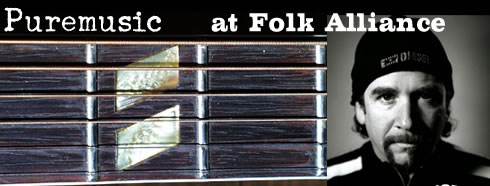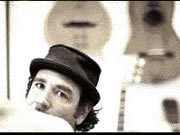
Interview with Phil Roy (continued)
PM: Is there good distribution out there for Grouchyfriendly?
PR: If you go to a record store, you can order it. A company called Phantom Sound and Vision carries it. But it's not the kind of thing where it's in stock at Tower records. That's been the hardest part of the whole deal, distribution. Because for the small distributors to handle it, they want to make sure it doesn't get returned. That means that it has got to sell, and the best way to make sure it sells is to put some marketing money into the product. They want to know that you have a little war chest of money to do a little promotion before they get involved.
PM: Like the Tower Records Listening Station.
PR: Right, it costs four grand.
PM: I know, we did that one time.
PR: Was it worth it?
PM: No. Sold some records, got us some gigs, but no. Especially at the time.
PR: And you know, I don't have any extra right now. I'm running lean, making a new record, spent twelve hundred bucks to come to Folk Alliance, you know? Or whatever it was. I wish I woulda saved some when I was making that big money.
PM: How is Zassafrass doing for you? [A very good booking agency, Crow Johnson and Carol Florida. They also handle Louise Taylor, Ray Bonneville, and other notable artists.]
PR: You know, they're getting me gigs and doing a really good job. They seem to be very well respected by this crowd of people, too. [At this point Michael Lille walks up, a fine singer songwriter who does Artist Relations for Elixir Strings, and we all shoot the breeze awhile before resuming.]
So, one thing I hope your readers get from this interview is that this stuff that's happening to me can happen to them. It's an important thing to know, that if you can make a record that touches people and you get a break, something can happen. I'm becoming the poster boy for that. If you just make a record that's good, chances are that nothing is gonna happen. Something has to be exceptional about it, a song or a performance, something -- and you have to catch a break, like I did with my friend giving the tape to a DJ. Just one song done exceptionally can be so much more important than going in and laying fifty down pretty well. There's too much music out there. But it is still possible to be an independent artist and get on the radio, and go to NYC for the first time and headline The Bottom Line. Louise Coogan of Sound Advisors hooked the gig up, don't try to do it alone. She talked to Alan Pepper, and because of all the play I was getting in WFUV, the room was full. Herbie Hancock was at my stage door after the show to tell me how much he liked the show; it's one of the highlights of my life.
PM: That's too much. Did you do that show with the guys from the record? We need to talk about them.
PR: Those guys...I mean, people respond well to my solo show, and I can do all the songs from the record. But I can't play like those guys. I went to music school, I'm a pretty good guitar player, but I'm a songwriter. Maybe I should practice some more, I'm seeing a lot of really good guitar players down here. The guys on the record -- don't listen to me, or the songs, just listen to the guys on the record. Because they are all artists unto themselves.
First of all, Heitor Pereira is among the most consummate guitarists one could ever meet. He's on the new Willie Nelson record. Willie's manager called Heitor up and told him, "Willie thinks you're the best guitarist he's ever played with." I introduced him to Hans Zimmer, and he's been on every film that Hans did in the last year and a half. We were trying to put a band together, and some of this music came out of that, we cowrote a lot of the record.
Ricardo Silveira is another amazing guitarist. Ricardo and Hector are friends from Brazil. Ricardo is a little older, and was at one point a kind of mentor to Heitor. They hadn't played together in eight years. Ricardo just happened to be in town when I was recording. So I knew that if I could get the two of them in a recording session, that something special would happen. I put a 1913 Washburn in Heitor's hands, and a 1956 [Martin] 0-18 in Ricardo's hands. So these old American guitars were in the hands of these Brazilian virtuosos. They'd never played a note of these songs together before. We ran it a couple of times, pushed "record" and that's what happened.
That changed my life -- that's why I'm married, that's why I'm on the radio, that's why I'm here. "Melt," which opened all the doors, was cut with a vocal and two guitars. The bass and violin were both overdubs. [Bassist] John Leftwich is another virtuoso, he's played with everyone from Freddie Hubbard to Lyle Lovett, and was Rickie Lee Jones' musical director for seven years. Buddy of mine for fourteen years. There are a number of other very talented players on the record, but the essential quartet is those three guys and myself.
Julian Coryell, son of Larry and one of the best singer songwriters out there, is also instrumental on the new record. I waited so long for people to cut my tunes, and it was important for me to put an outside song on the new record, and I picked one of Julian's, called "Nothing Left to Use."
PM: Are you going to put out the new record yourself?
PR: Have to, didn't want to. I'm not a flag waving Indie Artist, but I'm not waiting for anybody's permission anymore, either. I did that my whole life. I'm not waiting for their budget, or their idea about what tunes to put on the record, or what the single or the video will be. I've stopped waiting for people's permission to do music.
 |
|
| print interview (PDF) | |
| listen to clips | |
| check out philroy.com | |
| Folk Alliance snapshots | |
| read Arthur Godfrey interview | |
| puremusic home | |